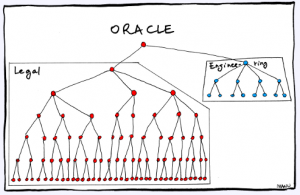
I’ll admit that my favorite type of humor is the kind that makes you uncomfortable. Maybe makes you squirm in your seat a little. If you don’t know what I mean then just watch Larry David in Curb Your Enthusiasm. If you want something a little more kid friendly then maybe Steve Carrel in The Office. After one episode you will know what I mean.
Well, I recently came across these funny org charts for several technology companies including Oracle (see image). I’m not going to get into the other firms (although there is plenty of material for a post or two on each of them!). Rather, I’d like to focus on the Oracle org chart and why it’s not really funny for Oracle customers.
Oracle is litigious
Oracle has a well-documented litigious streak. Whether it was Larry Ellison successfully suing the US government to allow the Peoplesoft acquisition, and taking down Tomorrow Now and SAP in the software support download scandal, or the not-so-successful move against Google over Java and its use in Android, Oracle will pull the trigger on litigation if it is in their best interest. Let’s be honest, who wouldn’t if they thought that was the best/only way to protect their own interests?
One might think that this litigious nature would be welcome by Oracle customers. After all, if Oracle is protecting their own IP and helping to move the technology industry forward. Wouldn’t that also protect the investments that Oracle customers have made in Oracle software licensing and maintenance/support fees? Well, maybe. But in reality, Oracle customers may also be worried that the big guns of Oracle litigation may one day be pointed directly at the Oracle customers.
Threat of Oracle legal part of the process
Why would customers feel this way? Well, it’s because Oracle sales and Oracle LMS use the threat of legal involvement as a way to pressure their clients into resolving issues that may be in dispute: “You need to work with us because you don’t want to get a letter from legal.” “Failure to resolve this issue in 30 days will require I refer this matter to our legal department.” These are examples of how the threat of legal is clearly part of the license compliance or even sales processes. I don’t think it’s something that Oracle legal condones (you would have to ask them), I just know it’s something that happens regularly.
Customers can be so worried about Oracle legal that they don’t even want to assert the rights they have in their contracts with Oracle. The perfect example is ULA certification which requires a customer to certify a license count to Oracle. Oracle LMS, however, will unilaterally insert themselves in this process. A client will not eject LMS because they “don’t want to rock the boat” or they “are worried about an audit”.
Clients have reason to worry.
At Palisade Compliance we’ve seen what happens when Oracle customers don’t know how to navigate the murky waters of Oracle legal contract terms and Oracle sales/LMS representatives. If done incorrectly, no one will be laughing. Get in touch with us for help taking control of your Oracle relationship.
